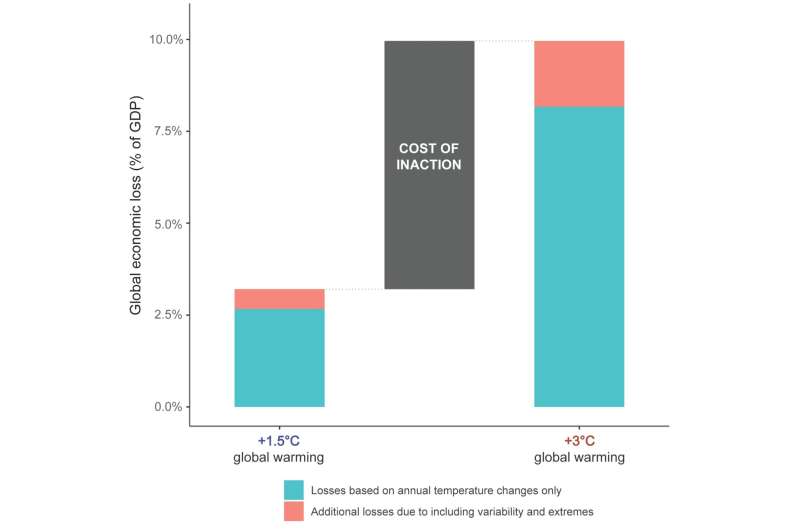This article has been reviewed according to Science X's editorial process and policies. Editors have highlighted the following attributes while ensuring the content's credibility:
fact-checked
peer-reviewed publication
trusted source
proofread
Study reveals substantial global cost of climate inaction

Traditionally, estimates of how climate change will affect global economies have focused on the effects of annual temperature changes. However, the additional impacts of variability and extremes in rainfall and temperature have remained largely unexplored, until now.
Using projections from 33 global climate models, an international research team, led by Paul Waidelich at ETH Zurich, conducted a pioneering study, published in the journal, Nature Climate Change, to quantify such impacts on gross domestic product (GDP) across the globe.
The investigative study revealed a global GDP loss of up to 10% if the planet warms by +3ºC. Importantly, accounting for variability and extremes increases the costs of climate change around the world.
"If we take into account that warmer years also come with changes in rainfall and temperature variability, it turns out that the estimated impact of spiking temperatures is worse than previously thought," explains doctoral researcher and economist Paul Waidelich. "Therefore, omitting variability and extremes risks underestimating the damage of temperature changes."
Stringent climate action is critical to future economic growth. Limiting global warming to 1.5ºC instead of 3ºC can reduce global losses from climate change by two-thirds. "Our results show that the cost of climate inaction is substantial," stresses ETH Zurich professor, Sonia Seneviratne, a co-author of the study and a Vice Chair of the Intergovernmental Panel on Climate Change's Working Group I.
"Some people still say that the world cannot afford rapid decarbonization, but the global economy will also suffer from the impacts of climate change."
Global warming of 3ºC also increases the risk of extreme rainfall worldwide, which reduces global GDP, on average, by 0.2%—which, at the current size of the global economy, would equal US $200 billion. Much of these costs occur in the US and in China, which, unlike warmer tropical regions, are less used to extreme rainfall. However, among the extreme events considered, heat waves are the most impactful.
The study suggests that nearly half of the global economic damage at 3ºC of global warming may be related to extreme heat. Fulden Batibeniz, a postdoctoral researcher at ETH Zurich and the University of Bern explains, "Higher temperatures may seem beneficial for colder countries like Canada, but as we saw in 2021, they also bring much more severe heat waves, which harm the economy."
However, projecting the impacts of climate variability and extremes is complex, and substantial uncertainties remain. When answering the question, "How much will climate change cost?" The research team concedes that uncertainties are primarily socio-economic: how long the impacts persist and how well can society adapt. Yet, how rainfall and climate extremes will evolve need to be better understood.
Since the study does not include non-economic impacts, droughts, sea-level rise, and climate tipping points, the authors argue that the total cost of climate change is likely considerably higher.
More information: Paul Waidelich et al. Climate damage projections beyond annual temperature. Nature Climate Change. (2024). DOI: 10.1038/s41558-024-01990-8. www.nature.com/articles/s41558-024-01990-8
Journal information: Nature Climate Change
Provided by ETH Zurich





















